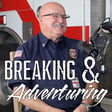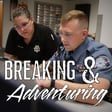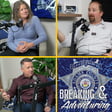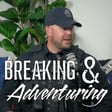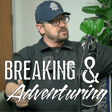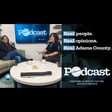Become a Creator today!Start creating today - Share your story with the world!
Start for free
00:00:00
00:00:01

Episode 8
Today on Breaking & Adventuring, we’re going to the dogs—literally.
Sgt. Andrew Smolinski and Sr. Deputy Ashley McLawyer from the Adams County Sheriff’s Office K-9 Unit join us for a deep dive into the unique bond between handler and working dog. For these deputies, the job doesn’t end when the shift does—their partners are part of their homes and their families.
In this episode, Sgt. Smolinski and Dep. McLawyer share what inspired them to join the K-9 Unit, the unexpected challenges they faced while working with their four-legged companions and why partnering with a K-9 on duty is one of the most rewarding jobs in law enforcement.
Do you have questions? We want to answer them. Send us an email to CommunityConnections@adcogov.org.
Recommended
Transcript
Introduction to 'Breaking and Adventuring'
00:00:28
Speaker
All right. Welcome back to another episode of Breaking and Adventuring, where we invite you into the world of the Adams County Sheriff's Office and beyond. We're going to share the backgrounds, stories, and experiences of the men and women in the Sheriff's Office and the greater law enforcement and public safety community.
00:00:41
Speaker
but I'm your host, Sergeant Adam Sherman. And today i have with me Sergeant Smolenski and senior deputy McLawyer ah to discuss life of a canine handler, traits needed to be a handler, skills trained between a handler and a canine dog, and stories about their experiences how they got to where they are. So you guys ready?
00:00:59
Speaker
Let's do it. Let's do it.
Transition to Canine Unit
00:01:01
Speaker
All right. So background, who are you? That's just a little bit of how you got to where you are. Uh, so Sergeant Andrew Sponsky, I've been with the Sheriff's office for 17 years.
00:01:13
Speaker
was a handler for six. And when I promoted back in September, I took over the unit as the Sergeant for the K9 unit. Cool. Um, let's see. It's been nine and a half years now that I've been on patrol on in the last four, almost five. So what led you to the world of K9 or had your interest of being a K9 handler?
00:01:37
Speaker
So I didn't have that typical, you know, you get a lot of guys are like, oh I was all interested in canine. mean, I was interested in the unit, ah but I always had dogs at home. i had three big dogs. We had a Doberman, a pity and a boxer.
00:01:48
Speaker
And the smallest one was 65 pounds. So every time an opening for canine came up, i was like, I'm going to wait. We don't need another dog running around. And so then finally, when I did decide to test former sergeant of the unit, he kind of comes to me and I like went to the academy with him and he says, listen, man, either the dog's either with you at work or he's at home in the kennel.
00:02:11
Speaker
was like, all right, sounds good. And so I went and tested and made the list and here we are. Nice. Yeah.
Overcoming Fear of Police Dogs
00:02:19
Speaker
I'm not going to lie. When I first started in the academy, when they came out to do like the demo day, yeah it kind of terrified me. And I was scared of these land sharks, like to be very honest with you.
00:02:31
Speaker
yeah But it, as I continued going on and um being proactive with the policing I was doing, I was like, you know, i it'd be a lot cooler if I had a dog to run after these people instead of me.
00:02:46
Speaker
So... that's My own personal observation of how you how you like to do your job and and in your proactiveness, having a little land shark, a land alligator with you is definitely more helpful. It's awesome. Yeah, because for those of you watching and listening, ah Deputy McLawyer here likes to find cool stuff and often does so. That's why Sherman's losing a little bit of hair, yeah yeah as you can see. Yeah.
00:03:15
Speaker
I call. Yeah. Or just like, I have to write a what another memo. Um, yeah, no. And you know, we, ah we, we've all crossed paths a few different times. So, you know, it's, it's been fun. I mean, looking back, I mean, especially that shift we were all on was pretty, it was really tight, tight group.
Training and Bonding with Police Dogs
00:03:31
Speaker
Um, is it like what you thought it'd be being, being a part of the canine unit or canine team, or is there anything that it would be surprising for somebody to know about just kind of the life of ah working a dog
00:03:45
Speaker
I think for me, I didn't realize how much goes into it outside of work. You know, canines, the one unit where it doesn't stop just because your day's over because you're on your weekend, right?
00:03:56
Speaker
ah Dogs come home with us. They live with us. They're with us 24 seven. so ah it was always expressed to me. And what I expressed to our handlers now is you get out of your dog, what you put into it. So when you're at home on your weekend, if you just let your dog hang out and do nothing and have a pretty crappy dog at work. Right.
00:04:14
Speaker
ah So the, the work that goes into it, the amount of time you spend with them outside of work was a little bit surprising to me, but totally worth it. Yeah. Good times. You have this little firm mystical rascal running around at your house and get a play with them there. And yeah. And just probably just reinstill some of the traits you need when it gets time to, to go on duty. I'm sure. oh yeah. The obedience and all that, just having them at home, you can work on the obedience and,
00:04:39
Speaker
help, you know, help that bring that along. So when it is time to beat at work, you know, they're actually going to listen to you. So. Gotcha. And then, i mean, for you, any, so at first you went from being afraid to then getting some courage, putting in for the team. yeah So is there anything that was surprising either once you got on team or so or, things that were unexpected? Uh, it is completely different than what I thought it was going to be.
00:05:03
Speaker
Uh, So it's not just like running around at a demo in the suit, like, ah, look at me. Yeah, no. And then like the handlers I did have, um, like as role models, guess when I was just the regular street cop, I guess, but it was,
00:05:19
Speaker
very eye-opening to see like even just your tactics um when you have to deploy your dog it's it changes so going through the academy and like learning all these different techniques that you have to do when you're with your dog versus like not it's it's just very eye-opening and it's it's a whole different learning experience and learning curve but yeah, I'd have to agree with him just having this extra fur missile at home.
Role of Handlers in Field Operations
00:05:49
Speaker
It's, it's a lot more work than what people actually really think it is, but it is so much fun and I want to change it for the world.
00:05:56
Speaker
Nice. Well, and just again, from just my observation too, it seems like when they're at home, i mean, for people that don't know like they're not always like Robo cop dog 24 seven, like at home, they kind of go into that home mode and they're a playful puppy. They're like a typical standard dog.
00:06:13
Speaker
Yeah, they can be. Each dog's different. yeah We have this little floppy-eared Basset Hound at home. It's pretty funny to watch these two roll roll around and play around. You got this 70-pound Malinois, you know, supposed to be this big, big bad police dog, and he's in there rolling around playing with his Basset Hound. So it's kind of kind of cool to see that side of it, too. you Yeah.
00:06:31
Speaker
But they are still just dogs at some point. Well, and I know too, and I was, i was very dependent on whatever handler, uh, on patrol. Cause whether it was a patrol deputy or even a sergeant,
00:06:44
Speaker
I relied on on the handler to so know the area better than me, set up perimeters. And so if we had something big that we knew, i mean, and I know Smo would jump on like, hey, I need cars here, here, here, here. Where me as a sergeant, I'm like, cool. Like that's already done. I'll check.
00:07:01
Speaker
Yeah. we kind of become the the experts at all that. Yeah. It's one of the few, it is one of another one of the few units where most sergeants just defer to the handler as, hey, you guys are the experts. You guys know.
00:07:12
Speaker
ah Let me know what you need. yeah You know, the fun part is we are one of the few ones that we can tell a sergeant or commander. No. Right. Obviously we've got to do it respectfully, but you know, any liability with deploying the dog ultimately falls on us as the handler. So we have that ability be like, no, I'm actually not going to send my dog even if you want me to. So it's interesting in that, in that aspect, you don't get that too often.
00:07:36
Speaker
Yeah. And you just kind of have, it broadens your, your view of maybe each incident you're rolling into, as opposed to maybe if you're just running the district, you're like, I'm just going to get there and figure out what I need when I get there. You guys are like just computing the whole way. Right. got to figure out what what the crime is. Can we even deploy a dog, you know, just based on what we hear, if we can, you know, okay, we have a perimeter, you know, what's the time-lapse been, how much how much distance has somebody covered? How big of a perimeter do we need to start to set up?
00:08:02
Speaker
Um, We're trying to figure all that out while we're going to the call as well. yeah And then 90% of the times we're the ones end up calling the perimeter. you know So as we're driving to a call, we're calling out where we want people to go.
00:08:14
Speaker
um so just having that knowledge of your areas where you're working, having that geography knowledge to be able to do that without having to stop and look at maps, ah you know makes you little bit more of that next level cop too, just that next level street cop as well.
00:08:28
Speaker
Yeah. Well, and I guess jumping on that, like what skills would you say someone would need if they wanted to become a canine handler? Like, are there any innate traits just in a deputy or a person? I mean, or do you guys just train all that?
00:08:42
Speaker
Like, yeah. I mean, some of it does come with the training and it's just going to take practice, a lot of practice with some of it. But, um, I've always been a big advocate for geography and because that's huge. Even without the canine, like if you Know your districts in and out.
00:09:00
Speaker
It's going to make your life so much easier. It's going to take that extra stress away for when you do get on scene and you have to think of all these other variables of, like you said, we have to be kind of very picky on what we choose to deploy on. And sometimes information can get jumbled, especially if you're going to other agencies. So as soon as we can get there and we know we have that good perimeter set, it just takes a huge portion information.
00:09:26
Speaker
that off our shoulders so we can focus on what's right in front of us for me. I think one that you develop, but it helps is just having an understanding of tactics.
00:09:37
Speaker
And I stole this from another handler who's a sergeant within our agency. You know, we go and work with a bunch of different agencies, not just our agency. So we have to adapt kind of what we do and how we do things to how other agencies may operate within their tactics. So just kind of having a general understanding of different tactics and how they work, uh, that goes a long way because it's easier for the handler and the canine to kind of adapt with an outside team than it is to try and get an outside team to adapt with how we do.
00:10:09
Speaker
So I'm that general understanding of different tactics goes a long way. Um,
00:10:16
Speaker
Being able to stay calm under pressure, obviously that's a big one in the cop world in general, but. Canine generally, we get into more to more of it than other people, right? So being able to be level-headed, make calm decisions, um recognize how situations may change because you could be out there deploying your dog in a situation to change where, oh, I can't deploy him anymore or ah suspect gives up as the dog's going out, right?
00:10:43
Speaker
Canine's one of the only tools that we can actually recall and bring back to us before they engage if need be. So being able to recognize those situations under stress is a big one too.
00:10:55
Speaker
Nice. Yeah. And even things that you guys are factoring in, you know, if you're sending a dog into clear house, you're, you know, you're constantly pumping. are Are there any other pets in here? or Any other, you know, people, you just, the whole litany of things that again, adds to the stuff you guys are constantly just computing as you're rolling in. So, yeah. And a lot of that, I mean, a lot of that does come with the training, you know?
Training and Selection of Police Dogs
00:11:13
Speaker
So we, we train in-house.
00:11:15
Speaker
Our handlers go through 10 weeks, about 400 hours worth of training. Yeah. when they initially get, get their dogs, that's their initial training. And then each month we have to do a minimum of 16 hours of training um per team at a minimum.
00:11:30
Speaker
So we're constantly training and that's, those are the things we're training in tweak and working on. And when you're doing that training, is it just our unit or do you guys train with other neighboring teams?
00:11:42
Speaker
Oh, we got a good network of neighboring teams. Uh, You know, being a six-year or a six year handler and then becoming trainer and sergeant, I mean, a six-year handler is really just a drop in the bucket in the canine world, right? So I've been fortunate because we do have a really good network in this northern metro area, even going down to Colorado Springs where I've reached out to other trainers at other agencies. Thank you guys, appreciate it.
00:12:06
Speaker
um You know, relied upon them about information and help with training and things like that. So, yeah, we have a really good network. with other agencies and we'll go train with them quite frequently.
00:12:17
Speaker
Yeah. Cause you always, you don't want to be reinventing the wheel. Every time you're coming up with training scenarios, you want to you use what's current best practices and everybody be on the same page as much as possible. I'm sure. So i'm that's huge. um Well, you kind of already covered my next question.
00:12:33
Speaker
Uh, what skills do you look for in a dog? So somebody who wants to be a handler, right? Here's some aspects I can work on myself, but like when you guys are choosing another dog to enter into the unit, what are you, what are you looking for? Yeah. So we, we go, we buy our own dogs. We go to vendors, uh, way most agencies are at least around here is the dogs will be imported from Europe, whether be Holland, Poland, wherever they come to vendors in America and then police agencies go out there and we go out and we test them and we look for green dogs, which means they're They really have no training.
00:13:04
Speaker
They don't know obedience. They've probably seen some bite sleeves, but they don't really have an out. They never really seen a bite suit. And so when we go and we test them, we're what we're trying to look at is kind of their whole, just the genetic makeup of the dog and just what the dog has.
00:13:19
Speaker
Right. And, Really, the biggest things we want is we want a good hunt drive, whether it be, ah usually what we'll do is like a ball test. We'll take we'll throw a ball or a kong out in some long grass or leaves somewhere where the dog can't see it, and we're going to see how long that dog goes and hunts and looks for that ball.
00:13:37
Speaker
Not so much concerned if they find it. It's more of how long are they going to go to keep finding it, right? Are they going to go out for like two seconds and be like, okay, I'm bored. I'm to go over here. Or are they going to wear themselves out and go to sleep looking for this ball? Right. ah So you want a good hunt drive ah courage.
00:13:54
Speaker
mean, you have to have a dog that has courage, right? No different than you want to have a cop that has courage. So we did, we have different tests that we run to see how a dog is going to react to different situations that they've never seen.
00:14:05
Speaker
And we want that dog that's at the end of a line. It's on a back tie on a harness. we We want the dog that's at the end of the line engaged, engaged, with whatever situation we're presenting. um They're not backing down, you know, they're not tucking tail and turning and running.
00:14:20
Speaker
um So those are probably the two biggest. So the skills you're looking for are just more those inherent traits, not necessarily a physical attribute. Cause I guess depending on the trait of the dog, they can overcome some of those things.
00:14:34
Speaker
um Sometimes. Yeah. You can, you can enhance some of them. You can't really build the traits into a dog, but you can enhance and dehance, but yeah. Yeah. if they don't have it, they don't have it. Right. Yeah. Cause even just like looking at our team, when you line up all the dogs, I mean, there's no cookie cutter. This is what we want. It's, you know, that you have we have big dogs, we have smaller dogs, we have agile, we have, know, but they all bring their own, uh, ability to the team to enhance the team.
00:14:57
Speaker
Yeah. oh absolutely Cool. Well, you alluded to it a little bit, uh, with some of the bonding, but how do you build like trust and bond between the candler and, and the dog? Well, if you have my dog, it takes a little bit longer to bond.
00:15:12
Speaker
some of Some of us males are more stubborn than others. Yeah. No, we had a ah pretty, i think ah I wasn't too long, but it was a longer bonding process. So I'd have to have him when I first got Tigger and we'd go just walk him around the parking lot at the sub. And then I got to the point, okay, let's go take him out to the yard, throw the ball with him. But he'd still come back and kind of like growl at me for a while.
00:15:38
Speaker
like yeah so Like, I'm your mom now. Yeah. like Focus. Look, I'm the captain. You will love me. You will love me. That's funny.
00:15:49
Speaker
But yeah. So, but now, I mean, he's, he's great, but yeah, some, each dog's going to have their own personality. So where mine took like three months ish, some was going to take like three weeks, you know? So yeah.
00:16:03
Speaker
That's fair. Well, I mean, another problem Ashley had was she's actually the third handler for Tigger. So he's kind of been through it. So she had to battle that. I had a quite a welcoming experience in 2K9.
00:16:16
Speaker
Oh, yeah. Yeah. i So the first dog that they got brought him in, met him one day, all right. The lead trainer at the time like, hey, probably shouldn't go be playing ball with him or anything in the yard. i'm like, okay.
00:16:31
Speaker
ah Sergeant at the time was like, eh, he's pretty social. He'll probably be all right. I'm like, all right. So take him out to the K9 yard. i got a couple Kongs and throwing the ball, throwing the Kong for him. And he'd go get it, bring it back, show him the other one. He'd drop it. We'd go. And out there for, don't know, five, 10 minutes. And ah go I go to grab his collar and go to leash him up. And he kind of growls at me. And I'm like,
00:16:54
Speaker
Well, I know what I would do with a regular dog. You know, I've had regular dogs. I'm like, but this dog's, you know, police dogs. I was like, all right. um so go play ball a little bit more go he comes back i go to throw the ball uh axel decided he wanted to nibble on me so he came up hit my forearm went one two three bit me three times on my forearm actually and went into like a full mouth bite let go and i was like ah that's not good so close up the yard go to the sergeant i'm like uh yeah yeah
00:17:26
Speaker
Can I get a bandaid or something? Right. End up going to the hospital. Got six stitches there. Yeah. Come back. Lead trainers like, go let me guess. I should have been playing ball. He's like, yeah, I'm like, my bad.
00:17:36
Speaker
Yeah. Well, sergeants know best. So just so you know. Yeah. So then carry on about a month or so after that, we start our actual canine academy. Yeah.
00:17:49
Speaker
ah We're getting towards the end of the first couple days, and dog was really spun up. Definitely had couple screws loose, we think. But come to the end of the night, we had to kind of battle him to get his harness off, and he's pretty spun up.
00:18:03
Speaker
We're going to put him back in the kennels, and I'm holding onto a his collar, and I pop his little vet muzzle off, which is just a cloth muzzle we put on. Uh, Axel took about, took about two steps towards the kennel where there was food and he stops U-turns and then tags my hand.
00:18:19
Speaker
Uh, another six stitches in the hand out for a while. I had a broken fingernails, all swollen. was pretty gross. And we're in the hospital and I looked at the Sergeant and trainer. was like, I don't think we're going to work out.
00:18:30
Speaker
I mean, at least he was consistent. mean, you got six stitches each time. So that's fair. Uh, yeah. So, uh, The bonding with myself and Axel did not go very well.
Bonding Process Between Handlers and Dogs
00:18:42
Speaker
So then we went back and they got Link, K9 Link. That went a lot better because we're still together and hasn't made me get stitches. So that's good. Yeah.
00:18:53
Speaker
Link was always pretty fun. Yeah. But generally the bonding just kind of, you know, we start out pretty slow. Like Ashley was saying, just kind of going for little walks, feeding them, doing most of that at the sub under with other handlers present.
00:19:06
Speaker
Once we have a little bit of obedience in and we know the dog's just not going to take off and be like, peace, we're out, right? Yeah. um Well, that's when we'll let the handler start taking them home. That's when the bond really starts to get set because then you're around each other all the time.
00:19:20
Speaker
You know, they start getting into a little bit more comfortable environment. Then that bond really starts to kind of grow at that point once they start going home with the handler, spending a lot more time and realizing that,
00:19:32
Speaker
Hey, this person here brings me food and keeps my belly full and gives me water and then takes me to go do fun things like bite stuff and find drugs or bombs. So um I like this guy. i think I think we'll get along for a while.
00:19:44
Speaker
Nice. Yeah. So I know, i think stereotypically when people think of like police canines, I think just so like your old school, like German shepherds and stuff, what type of dog, because we have a fairly diverse team. What what type of dogs do we have and utilize?
00:19:58
Speaker
Yeah. So, We have 10 dogs in our unit, which think we're like second or third biggest in the state as far as dual purpose dogs go, meaning... ah Majority of our dogs either find people or they find drugs and or bombs.
00:20:11
Speaker
So of the 10, we do have one single purpose floppy eared lab, Reese, who's out at the courthouse. ah His only job is to look for explosive stuff. We have two other jobs dogs in the jail.
00:20:23
Speaker
One is an all black German shepherd car. And then another one's a Mal. They're both, uh, patrol and narcotics. And then on patrol of the other seven, we have three Dutch shepherds, a couple more Malinois and a like Czech German shepherd guy.
00:20:44
Speaker
Nice. So we've quite a mix. Um, yeah. Nice. Yeah. So you break away from like, just, you know, the standard, what you think of it more again, towards just those traits and and the abilities of, of each individual dog.
00:20:58
Speaker
Yeah, like when we look for dogs, we don't just say, oh, we want this specific breed, right? it's We'll test what dogs the vendors have, and if that dog passes our test, then cool. i mean, I haven't seen it, but I mean, if a little chihuahua came out and passed all the tests, you know.
00:21:14
Speaker
Let's do it. Sign them up. Let's give it a shot. See what happens. Nice. So what does a typical workday look like for handler and their canine partner? Just...
00:21:25
Speaker
it's actually really fun when i get ready for work um especially like on graves is when i would notice it a lot um ah soon it's like he has this clock and he knew it was time to get ready for work yeah it's like he would see me through the back window and he's like all right it's time to go so be sitting there jump out the back door they ready pound his red bulls getting a workout it yeah And then he knew like, all right, let's go. So we go out, get in the truck. And then the rest of the night he's just spinning circles. But if I, if I didn't put his vest on before we left the driveway, like it it was like, okay, let's go to work and go briefing. I'll see you.
00:22:09
Speaker
Cause all he wants to do is just spin in that truck or get out and go find something. Yeah. So if, if I had like half his energy, it would be amazing. but yeah, it's, it's amazing how they, well, and I think too, and this just, you know, from being around some of you guys is
00:22:28
Speaker
for them, the the work is fun. You know, what you would normally think you'd take your dog park to, or your family dog out, you know, play some catch, like them actually getting into work mode is enjoyment for them.
00:22:39
Speaker
I mean, that's kind of, you know, letting letting them get out and work is kind of, is their play. Yeah, no, that's what we kind of work for is that when they come to work, it's like, yeah that's when they get to go have fun, right? That's when they get to go find the drugs or find bad guys, whatever it is. um That's their fun time when they're at home. It's kind of like, ah this isn't the greatest. I'd rather be at work.
00:23:00
Speaker
We actually have an entire video on what it is like getting ready for work. We do. So yeah, if anybody's interested, feel free to go to the Adams County Sheriff's Office YouTube page or scroll through our social media and you will see Sergeant Smolenski and his partner Link in a very funny video. for a day And it knows it's realistic. It was a documentary style. We just went shot for shot of how their day goes. yeah um So you, and for, for both of you, is there like a memorable incident or case that you can recall that like where your dog and, or, you know, whatever they did was crucial and either finding something or um kind of solving or finishing out whatever the incident was.
Impact of Police Dogs in Operations
00:23:43
Speaker
Yeah. to Tig's been a part of a lot of huge cases. And I think a lot of them, I mean, it's,
00:23:55
Speaker
uh yeah some of the guys are gonna laugh at me but you're gonna fall over a lot of fences when you're deploying your dog yeah it's inevitable it's gonna happen yeah do your yard yard uh i think the most recent one i guess um just being able to do a track and when you see their behavior change like they're in that human odor and find it. So we, a guy in a stolen truck who ran away from us.
00:24:25
Speaker
So, excuse me, we got that, uh, the perimeter set up and it was great. It was quick. So I hauled off with the dog in my cover and we're out in this little field. And of course I see his behavior change. So I kind of hit my,
00:24:40
Speaker
partner Like, wait, just give it a second. And he dives into the bushes and you can hear them yelling. So please, i will cooperate now. That's what they'd normally say. Yeah.
00:24:51
Speaker
It's just, it's, it's awesome to see that behavior change and like all that training and all your other deployments come into work, but. It's cool. It's rewarding for us, too, because now we're not letting this other like criminal off the streets. And then that one actually led to a bigger FBI case.
00:25:08
Speaker
And then I got to help do the FBI hit for that one, too. So that was yeah like a full circle moment. That is really cool. Yeah. and and And all that training and hard work, you know, it kind of comes to fruition in those moments. That's got to be rewarding.
00:25:21
Speaker
That's cool. The one that always stands out for me was we're pretty early in a career. Westminster PD had called for cover for a dog. They get there, they had a DV and it was husband or boyfriend. I remember fired shots at his girlfriend in an apartment. We're about 92nd and federal area.
00:25:40
Speaker
He took off into the neighborhood. So get it set up. was me and another dog. And it's kind of funny. I totally kind of messed up how we, how we should actually deploy, but it worked out. So we get going and we literally were coming to the last house and getting ready. We're walking up and I see links, this head go up in the air, his nose go up in the air. and He starts going back and forth and,
00:26:01
Speaker
I'm like, Oh, he's high. so I'm like, hold on back out. So I was thinking roofline, you know, but this house was an old like Pearl Mac house. Right. So single story with a basement. And then it has a carport on it. And under the carport, there's this Ford econo line van and it was raised a little bit and it had the ladder on the back and that ladder.
00:26:19
Speaker
was right up against the fascia of the carport. So if you're walking by, it looks like that thing is like right there and that you can't, you know, there's no way you could get anything under it. And so we're kind of looking at the roof line. We're not seeing anything. So then you start clearing with link and then right out of the corner of my eye, we're under the carport. And I mean,
00:26:38
Speaker
We got like maybe six inches. If that here, I see these pair of eyes just kind of staring down at me on top of this Econoline van and ended ended up being the dude. And so we got him in custody and he fought a little bit afterwards, but yeah it was just cool. Like we were able to, like, like Ashley said, you know, you see that change of behavior and you locate this guy. So one, you know, you're helping to bring justice with a victim.
00:27:00
Speaker
You're keeping other cops safe because you know, without that, you know, one, when they've even found them, but two, Would they have walked in there blindly and, you know, he just popped off ground. So potentially armed. So could, did we just prevent a potential ambush situation?
00:27:16
Speaker
Yeah. Cause at the end of the day, that's what the dogs here are for is, you know, help locate and help protect and keep, keep our other cops safe. Yeah. That one always sticks out to me as just a ah good find.
00:27:27
Speaker
Yeah, no. and And with, with any use of force, I mean, the whole goal is to end a situation as quickly as we can to render everything else safe and everybody around that situation. So, and and having the canines is like a force multiplier where they've got skills that we just don't have, whether it's the, you know the, the, the smelling ability or just their their senses.
00:27:47
Speaker
So yeah, having them and those areas are crucial. Yeah. Like I know one thing I used to love is, you know, there'd be a deployment or something like, More often than not, surprisingly, these guys, you know, we finally get them in cuffs and they'd be like, I'm so sorry. That dog was serious. Like I shouldn't have done that. Like they're doing like this whole roadside confession yeah after the, uh, the dog got to say hello. So that those are always, those always cracked me up.
00:28:11
Speaker
Uh, to any funny stories or experiences you've had with your dogs that, uh, Besides falling over fences. Besides falling over fences. I didn't have a fall over fences. We were doing an area search.
00:28:25
Speaker
and I had them on a long line, and it was cold. It was kind of winter. But a Link decided to circle around me a couple times. Okay. And then he decided to run. Well, then the long line was wrapped around my ankles. And, I mean, I went feet straight up and backed down. Like it was like a cartoon? Oh, it was like 100%. Yeah.
00:28:42
Speaker
Boom. Bam. I just laid there for a minute. And he like comes up and like looks at me and niggas me. Like, what are you doing? I'm like, get Listen, mother. yeah So how long are those long lines? ah Different lengths. 15, 30. Okay. Those are the probably the most common ones. This is super long.
00:28:57
Speaker
We also have 1,500 foot lines, too. Just kind depending on what areas we're working in and what we have going on. Nice. You know, if we're deploying with our SWAT team, we usually... maybe 50 foot lines, 30, 50 foot lines and kind work that nice that area, do some casting clearing with them.
00:29:14
Speaker
It all depends. Anything with Tig or is he just all serious all the time? Nothing funny ever happens? ah No, I'm the comedic relief when it comes to Tig. He's Wonder Dog. He's Wonder Dog. he is wonder Yeah. ah No, so for the the guys who always want to give me s*** for fun. Oh, I say s***.
00:29:32
Speaker
Beep. Don't pick that They like to make fun of you. It wasn't me. All right. I knew it was going to happen. Whoever bet on her cussing first, you just won on your bingo card. So, uh, anyway, for the guys who want to give me crap for falling over the fences, uh, TIG saved their lives, uh, twice. So, okay.
00:29:58
Speaker
Yeah, it's just, I don't know. it's It's great seeing them. Like, they go dive in. So if they're fighting with a bad guy and Tig just goes and dives in and one guy's rolling around and ends up on top of my dog. And I'm like, okay, you have to get off now so I can get my dog. Yeah, yeah. Wait, what? And, like, get off my dog so I can get him off.
00:30:18
Speaker
But, yeah, no, it's I'm definitely the comedic relief. to Tig trains me, let's be honest. That's fair. Yeah. We're all on the dumb end of the leash. Yeah.
00:30:28
Speaker
Yeah. I'll just follow, I guess. Yeah.
Rewards and Diversity in Canine Handling
00:30:31
Speaker
Um, what's, what's the most rewarding thing about being canine handler? You would say, or just, is there anything that sticks out? I think like we said is you have the dog or this tool. It's a locating tool to help find people. And at the end of the day, it's a way to help keep our other officers safe.
00:30:49
Speaker
You know, we don't have to send a cop in somewhere and we can send a dog in. or if a dog can locate a person hiding, you know or even you know the other side, the dope side or the bomb side, you know and you find a good amount of drugs that you can take off the streets, or you actually find an explosive device, um you know you're protecting the community, you're protecting the citizens, and you're protecting your fellow fellow officers.
00:31:13
Speaker
And not not only that, but how many times have we had, whether it's a car chase, foot chase, something where a suspect is known to have a gun, maybe they even fired it, they're on the run, they pitch it somewhere,
00:31:24
Speaker
well, now we've got an unsecure weapon that we don't want a kid or somebody else to come across. So how many you know how many times, dozens of times have have our handler or our handler and canine team been able to recover those? Yeah. We just recently had that.
00:31:39
Speaker
Deputy Peacock with his canine con helped Commerce City locate a gun used in a homicide in an area that was hidden in an area that they probably wouldn't have thought to look at or searched and with the help with con being in there and doing what he does you know he actually helped locate this gun used in a homicide so that's amazing yeah yeah so crucial for cases crucial for public safety so that's awesome Yeah. Um, my first real shift with Tigger after getting, I'm sorry, you said shift shift. Okay. I just want to make sure we're good. uh, I actually got two, um, fights with him that first night after training or the whole Academy. So, um, the first point was doing a house or clearing the house for the suspect and,
00:32:30
Speaker
At the very end, he ended up finding them in the carls place crawl space, and it was just, like, being able to see all the, like, everything come together, especially right after the academy.
00:32:43
Speaker
It's huge. And then, like, three hours later, going getting another bite, it's like, this is, yeah. yeah Or finding, like, the amount of drugs that you can find. it's It's just a great tool to have, and it's, I can't even describe how rewarding it really is, so.
00:33:00
Speaker
Are there anything, and experience you'd like to share about your unique position on the team? Yeah, so i am one of the first female canine handlers on patrol.
00:33:14
Speaker
So that's a huge accomplishment. So it's awesome to be able to like hopefully be a good role model for all these other aspiring female deputies or current female deputies, people who want to join law enforcement. Like you don't have to be a big burly dude to be able to yeah handle a dog. Yeah. Anybody can have a dog bite your hand and give you six digits. Absolutely. Cake work right there.
00:33:40
Speaker
And don't get me wrong. It is a lot of hard work, but it's, it's great. And we get more creative on how we have to handle the dog or handle those scenes and be able to take it that route.
00:33:53
Speaker
So. Well, and I think that's a good aspect too with any specialized unit, but just kind of any, it's good to have those multiple perspectives because there's multiple ways to handle a situation. Can't, there's no just textbook. Here's how we send a dog in.
00:34:06
Speaker
So tap into those different points of view. Well, females generally actually have a little bit easier time being handlers. Yeah. One things we, like when we praise our dogs, right, we do a really high pitched fun tone, right?
00:34:19
Speaker
ah Most of us guys were very like, oh, that's a good boy. Good boy. Oh, good job. There you go. ah Yeah. It takes guys forever to get, get over that. Right. Cause we're all like, no, good yeah good job. Right. Good, good boy. Good job. dog Females just naturally have that like nice nurturing tone and instincts and dogs respond to it really well. So ah females generally have a little bit easier time of being handlers and getting dogs to listen to them and We all kind of joked within the unit. We wanted to see what would happen if Ashley was going to take over Moose.
00:34:49
Speaker
Yeah. see how Moose would reply. No. A lot of us thought it would actually work out pretty good. Well, what's unique about Moose that people may not know ah why that's funny? Yeah. Moose is one. He's huge. Yeah. lives up to his name. Yeah. He's Dutch shepherd that runs about a hundred to a hundred and anywhere from 90 to 110 pounds, depending on how he is. And it's all muscle. it's bikini sees or not. yeah yeah if he want some trim dough Yeah. Yeah. And he will look into your soul.
00:35:20
Speaker
hi just, yeah. He can be terrifying. Yeah. Yeah. yeah look through your soul. Yeah. No. And I, and but I think you bring up a good point. Like in with a lot of our positions, it's not what you are that matters. It's just, are you able to do the job and contribute? And there's doors are open for anybody if they're willing just to put in the work and, and, and apply themselves.
00:35:43
Speaker
I think that's huge. and and and And you're right. You said a great example. I mean, your whole team. Uh, but you know, actually when you're out at public events and stuff, girls love coming up a to see the dogs, all kids, but then B I think it's really cool for them to see like, yeah I'm the handler. Here's my police car. You know, here's what we do as a team and just see you leading the way on that. So that's cool. That's great.
00:36:06
Speaker
So I do have a question. Uh, so I've got a lot of questions. Yeah, I've got a couple more, but this one just came to me. So, uh, heard a rumor. So we do have, uh, canine cards with your dog on the front and some stats and full, cool stuff that, uh, we hand out at public events or like our fair. We encourage people to meet you guys and meet the dogs and collect those.
00:36:28
Speaker
I heard a rumor that other people get to have one of those cards at certain times. there Like maybe somebody who got to meet the dog in the middle of a call for service or. We heard of a handler that whenever they would do a dope sniff um and that person would get arrested for the possession of said drugs, the handler would leave a card, ah the canine card in the person's possession.
00:36:56
Speaker
So when they got out of jail, they. would see the dog that helped find their drugs. Oh, we get to meet again. That's funny. Yeah. Like almost like a, you got served by this dog. My favorite is our bite coins.
00:37:10
Speaker
So if we're getting in on a deployment or somebody wants to go tase somebody before we get there, we yeah leave them a little no bite coin. Like seriously, you can have waited 30 seconds.
00:37:22
Speaker
Right. Cool. Or we have the ones where, you know, the dog is there, ah the send is perfect. And then they jump right in front of the dog to go tase them or do something else. Yeah. yeah So that's for the deputies like, Hey, thanks. Thanks for taking that.
00:37:37
Speaker
Yeah. Yeah. That's one of those, um, things. It only, it only takes once to learn your lesson. Yeah. I personally did that where I thought I'd be polite and step in front. I was about to clear. I went to go open the door.
00:37:49
Speaker
And as I reached in front, the dog turned, nipped my thigh. And it was just a quick like little boop. For like two weeks, I had the full outline purple. Like, it was like, oh my gosh, like that, that dog and handler are long left the team, but it was just like noted. We'll never, ever do that again.
00:38:07
Speaker
so yeah, just anytime I was, I was cover for on a track or anything. Like I was always like, almost like a, like a field goal kicker. I was always like three steps and like two over like you plenty of space for you guys.
00:38:19
Speaker
Um, well, as we wrap up here, uh, is there anything that people would be surprised to know, or, or may not know just about being a a canine handler just in general, or.
Retirement and Adoption of Police Dogs
00:38:28
Speaker
i think one of the most common questions we get is what happens to the dog when they retire.
00:38:32
Speaker
ah so cross that one off my next list. All right. yeah no It's super comics. i was gonna ask the same thing. Yeah. ah So essentially what happens is when the once the dog retires, usually around eight years old, kind of when we start looking at it, it depends on how well they're working.
00:38:48
Speaker
Handler gets first choice. ah We do have a little tradition within our canine unit. So say somebody started working a dog and then they moved on, whether they promoted or whatever.
00:39:00
Speaker
What's supposed to happen is if somebody takes over that dog, the new handler is supposed to go to the old handler and say, hey, ah You worked them first. Do you want it? Generally what happens is no, because they only worked the dog for maybe a year or two. And the second handler worked them for the majority of the career.
00:39:16
Speaker
But regardless, handler gets first shot. If they want to take the dog, they pay the county a dollar. county assets, so they pay them a dollar. If for whatever reason a handler can't or they don't want to, then we'll look within the unit.
00:39:32
Speaker
I don't think we've ever had to go outside of the unit, but if we did, we'd look within the agency at previous handlers. go go that way. Yeah. we're not just going to dump them at the Adams County shelter and be like, Hey, here you go.
00:39:46
Speaker
Yeah. Yeah. They don't go to the pound or shelter. They don't get put up for auction or anything. Yeah. I mean, I know that you guys are just a tight, I mean, we talked about that bond. I mean, so yeah. and And, and plus you get to continue that bond and the dog gets to go and live a happy retirement at at home. And we get the memory phone beds now. and ill Yeah. And just have the kids crawling on them and stuff. So yeah, ah that's fun.
00:40:09
Speaker
All right. One last question. All right. What happens to a dog when they retire? So since my dog is coming up on retirement. Oh, yeah. Yeah.
00:40:20
Speaker
See, I was trying to be silly, but yeah go ahead. Yeah. ah I forced my dog into early retirement. But ah yeah, this memory foam bed that you speak of.
00:40:31
Speaker
No, I tried it. And yeah, I knew i was going to regret it. So I bought a cheaper one, luckily. But yeah, it lasted um maybe five hours.
00:40:44
Speaker
Maybe. Okay. Yeah. He shredded it. ands Everything gets shredded. So... And he's like, mom, look who you get to clean up. Yeah. Uh, no, he's, he's great. And i have my seven year old son. So he goes out in the back and they could play fetch and my tigs just running behind him, like playing soccer, doing stuff like that. So that's awesome.
00:41:11
Speaker
As long as we can keep them occupied, there will be no shredding. Yeah. Yeah. Yep. I mean, they still got to stay busy, right? They're still, yeah, they may not be able to physically do the job as well, but they're still mentally there for the most part.
00:41:24
Speaker
um Yeah, so when they retire, they stay at home with the handlers. Handlers then absorb kind of all the costs, whether it for food and vet bills, all that. know, county pays for all that up until retirement, and handlers take over all that cost, and then they stay at home, and they get fat and happy. and Yeah.
00:41:42
Speaker
Yeah, they go to do fun dog stuff. And like with a like a retired human cop, I mean, they still sit with their back to the wall at restaurants and stay vigilant as they're driving. yeah. complain about all the new stuff. Yeah. ah Well, awesome. Well, i greatly appreciate you guys' this time. i mean, you guys are vital resource, not only to our staff here at the Sheriff's Office, but regionally and even as you go. and train others and pass along your knowledge and experience to to newer handlers and and newer teams that are up and coming with different agencies. I mean, you guys are huge asset. So thank you for all that you do. And thank you for making time for for us today.
00:42:19
Speaker
Yeah. Thanks for having us. yeah Awesome. Well, Uh, as we mentioned, uh, for all of our cool and fun videos that we have out there, you can follow us on Facebook, uh, X Instagram, YouTube.
00:42:31
Speaker
Um, and also we have an email address that you can send in. So community connections at ad code gov.org. If you have any questions, topic ideas, or just anything to follow up on that we could answer for you.
00:42:43
Speaker
Um, and until next time, ah we'll see you again.
00:42:57
Speaker
Bye.

